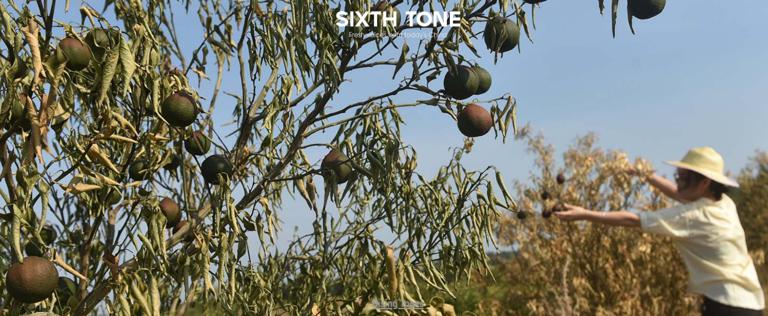Rain finally fell on Li Benguo’s parched peach farm on Thursday after almost a month. But it arrived a little too late. For many farmers like Li, the record-breaking heat wave that has baked southwest China has already taken its toll. The summer drought has cost him at least 100,000 yuan ($14,600) as soaring temperatures sizzled his peach trees sprawling over 30 mu (2 hectares) in the suburbs of Deyang, Sichuan province. “Peaches are the star product in Deyang and always easy to sell, but the high temperatures have damaged almost one-third of them,” Li told Sixth Tone. In Deyang, like other places in the southwest, the country’s worst heat wave in over 60 years has plagued locals, disrupting power supplies and resulting in a severe drought that has wreaked havoc on agriculture. Parts of the hydropower-dependent Sichuan province have announced rolling electricity cuts and rationed water supply, while wilting leaves, dried river beds, and parched crops have become a common sight in the usually water-rich province.

Rain finally fell on Li Benguo’s parched peach farm on Thursday after almost a month. But it arrived a little too late. For many farmers like Li, the record-breaking heat wave that has baked southwest China has already taken its toll. The summer drought has cost him at least 100,000 yuan ($14,600) as soaring temperatures sizzled his peach trees sprawling over 30 mu (2 hectares) in the suburbs of Deyang, Sichuan province.
“Peaches are the star product in Deyang and always easy to sell, but the high temperatures have damaged almost one-third of them,” Li told Sixth Tone.
In Deyang, like other places in the southwest, the country’s worst heat wave in over 60 years has plagued locals, disrupting power supplies and resulting in a severe drought that has wreaked havoc on agriculture. Parts of the hydropower-dependent Sichuan province have announced rolling electricity cuts and rationed water supply, while wilting leaves, dried river beds, and parched crops have become a common sight in the usually water-rich province.
Now, future food production has become an increasing concern, too.
Drought is the largest contributor to crop loss in China, which has now been aggravated by risks posed by climate change. In early July, authorities had warned that high temperatures were likely to affect the country’s rice and cotton production, with experts estimating that it could reduce the spring corn harvest by 30% this year.
As China heightens the importance of ensuring food self-sufficiency, the grim agricultural outlook has also worried policymakers at the highest levels. On Thursday, four central government departments, including the Ministry of Agriculture and Rural Affairs and the Ministry of Water Resources, stressed the need to protect the fall harvest, which accounts for three-fourths of the annual food production but is now under “severe threat.”
To relieve agriculture losses, China’s Ministry of Finance in mid-August allocated 300 million yuan in disaster relief funds to 13 provinces, including Sichuan. The money will be used to buy seeds, pesticides, and other materials, while authorities in Sichuan are also pushing for agricultural insurance to help farmers claim for crop losses.
Meanwhile, the provincial meteorological service on Thursday forecasted rain and isolated thunderstorms for several locations across Sichuan. The flood prevention authorities warned cities of potential flash floods, as parched ground lacks the ability to absorb water and is more vulnerable to floods.
But the prediction of the much-needed rain hasn’t been able to address the woes of many farmers. Li, who traded his city job for orchard farming in 2016, says extreme weather is one of his top concerns in agriculture.
In the spring, he saw his orange trees bear very few flowers and fruit due to the heavy rainfall from the previous year. Come summer, his peaches were damaged by scorching temperatures. And the future seasons are just as unpredictable under the impact of climate change.
“There is really no solution,” Li said. “In farming, you just have to deal with these issues.”
Sources:
SIX TONE
Provided by the IKCEST Disaster Risk Reduction Knowledge Service System
Comment list ( 0 )
